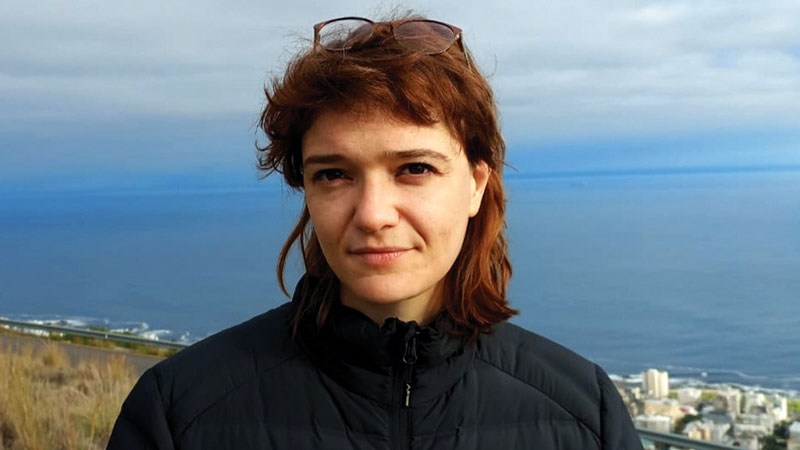Edyth Parker, a postdoctoral research associate at Scripps Research, will do just about anything to stay out of the spotlight. Ask her about her research, and she’s quick to name collaborators; she would rather they take credit for the work. Then she lists projects that colleagues at Scripps Research are undertaking— these might deserve more publicity, she says.
Parker doesn’t try to evade attention because she’s shy. On the contrary, she is chatty and eager to talk about her work, with a contagious laugh. Her apparent modesty when it comes to her research has more to do with its very nature. Parker—who joined the lab of Scripps Research professor Kristian Andersen in early 2021—studies infectious diseases such as Lassa, Ebola and COVID-19, in the lower-middle-income countries (LMICs), often at a very local level. Her ultimate goal is to further enable communities to manage disease research, surveillance and control measures themselves, rather than having to rely on external support.

“It’s all about reducing the current asymmetries and inequities in global health and further empowering our local partners,” she says. “If we do it right, it makes us (the foreign researchers) completely redundant and I, for one, take great pride in being made redundant.”
One step toward that redundancy: giving the much due limelight to local scientists and public health officials in places like Jordan, Nigeria and the Democratic Republic of Congo. “These are the people on the ground doing all the work and we want to give them power back,” says Parker.
Parker grew up in post-apartheid South Africa, where HIV was ravaging the population. Constant conversations about the HIV pandemic piqued her interest in science. She began to wonder not only about the cellular and molecular underpinnings of viruses, but also the complex social aspects of fighting disease. As an undergraduate in South Africa, Parker studied biotechnology and participated in a program aimed at developing future political leaders. It was here that many of her ideas about global health began to take shape.
“Growing up in South Africa really exposed me to the reality that much of global health is a neocolonial exercise,” she says, referencing the idea that high income countries (HICs) can use health aid as a way of controlling LMICs.
In graduate school at the University of Cambridge and University of Amsterdam, Parker tackled avian influenzas, trying to better understand how and why these pathogens evolve so much more quickly than many other viruses and how some subtypes— including the most well-known H5N1 and H7N9 strains—can infect humans. But in the last months of Parker’s graduate research, COVID-19 hit.
“Even though it wasn’t an avian influenza—at least this time—the COVID pandemic really solidified my view about how urgent this kind of work is,” says Parker. She wrote her avian influenza dissertation as the pandemic circled the globe, and then joined the Andersen lab at Scripps Research, where she immediately jumped into COVID-related research.
Once at Scripps Research, Parker teamed up with Issa Abu-Dayyeh, an immunologist in Amman, Jordan, who was struggling to study the spread of COVID-19 in his country. More resourced countries had established genomic surveillance programs to constantly sequence COVID-19 genomes from patients. This let them track how the virus spread and evolved. But, in early 2020, Jordan did not yet have this kind of program and Abu-Dayyeh wanted help setting it up.
Over the coming months, Parker and the Andersen lab worked with him to integrate genomic data, information on reported COVID-19 cases, and travel data collected by the Jordan customs agency. They (or mostly Abu-Dayyeh, to hear Parker tell it), painted a new picture of how local, land-based travel—and not international flights—drove the spread of COVID-19 across the Middle East.
“The majority of other studies about what drives COVID-19 transmission have been done in Europe or North America, where you have freedom of movement in a way that you don’t always have in other regions,” says Parker. “And so it’s really important that we understand the fine-scale dynamics of pathogen spread within other countries and regions.”
A preprint manuscript of the findings was published in January 2022, with Parker as the first author. The conclusions, she says, can inform the development of future travel restrictions or pandemic control measures that are based on local data from the Middle East rather than a one-size-fits-all approach.
More recently, Parker has teamed up with researchers at the African Centre of Excellence for Genomics of Infectious Diseases (ACEGID) at Redeemer’s University in Nigeria to undertake a similar project, with the goal of better understanding how two COVID-19 lineages spread through the country. To these kinds of collaborations, she brings her expertise in viral evolution—along with the sequencing and analysis capabilities at Scripps Research—but says that she lets her local collaborators lead the way.
“I’m an African public health scientist, but most of my work has been done outside of the continent, and I’m very aware of how little I know,” says Parker.
“Outsiders can never really comprehend a lot of the local complexities of public health.”
Beyond her research, Parker has found an outlet for her stress and frustrations in combat sports, from Dutch and American kickboxing to Muay Thai and Krav Maga. It’s a hobby she picked up in her youth and has found time for throughout her training and moves around the world. She tries not to use her skills on her lab colleagues, she jokes.
When this interview concludes, Parker again stresses that her story is really one about her collaborators. “I have a lot of fun doing my work, but only because I work with good people,” she says. “Just put as little of me as possible in the piece.”

